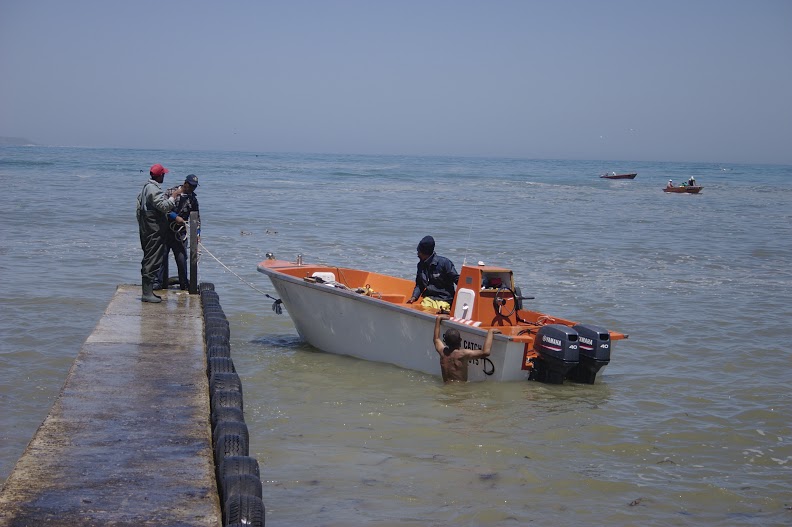Small fishers need a bigger share of resources
More than 95% of fishing rights go to commercial fishing
A shadow looms over the admirable initiative launched this week to finally grant fishing rights to small-scale fishers. Unless the disproportionately large share of marine resources currently allocated to the commercial fishing sector is cut, there will be nothing left to hand out. The process will be a farce.
Over 95% of all marine resources are reserved for commercial rights’ holders. Quotas for ten species – including linefish, abalone and West Coast rock lobster – are currently up for re-allocation to commercial rights holders in the 2015-2016 Fishing Rights Allocation Process (FRAP). Unless this proportion is substantially reduced, the new policy will be a non-starter.
The Small Scale Fishing Policy has just been signed into law with an amendment to the flawed Marine Living Resources Act of 1998 which recognised only three categories of fishers: commercial, subsistence and leisure. The division was stark: those with subsistence and leisure rights were entitled to consume but not sell what they caught.
Only commercial rights holders could sell. In a stroke, this outlawed the traditional livelihoods of most of the 30,000 odd fishers in villages along the Western Cape, Eastern Cape and KwaZulu Natal provinces who for decades had fished to feed their families and sold the rest of their catch. Amounts were negligible but enough to keep poverty at bay in areas where unemployment was high and fishing was the only source of income.
There is a convincing argument that criminalising the harvesting of a resource considered to be their god-given right has damaged these communities. Fishing became “poaching”. Gangs took over the marketing of the more valuable species such as abalone. They brought in drugs and guns. But they also enabled parents to pay school fees and feed their children.
Some individuals were awarded commercial fishing rights and this sowed divisions and deepened inequalities in communities which had been relatively egalitarian.
The new policy introduces a fourth category: Small Scale fishers. Craig Smith, Director of Small Scale Fisheries, argues that a 50% share of linefish should be reserved for these small scale fishers as well as up to 100% of near-shore resources such as mussels, abalone and lobster. Commercial fishers can afford the big, fast boats required to exploit the deep seas.
The person responsible for making this decision is the Minister of Agriculture, Forestry and Fisheries, Senzeni Zokwana. Since 1994, the colour of those awarded the right to mine the ocean’s resources has changed considerably but they still overwhelmingly represent the more powerful and politically connected. Giving small scale fishers a generous slice of the cake will indicate a new willingness to cater to the poor, rather than an elite.
The policy has taken over a decade to be implemented. It originated in a court case brought by an NGO, Masifundise, to the Equity Court, arguing that the Marine Living Resources Act created inequality. It infringed the fishers’ constitutional rights to food security and the protection of their traditional culture.
The outcome was a court order to the government to create a small scale fishing policy. Masifundise has threatened to go back to the Equality Court if the Minister fails to give the small scale fishers an appropriate share.
Meanwhile, there is much excitement around the next stage of the process: the identification of suitable candidates. Representatives of the Department of Agriculture, Forestry and Fishing (DAFF) will visit 280 communities on the east and west coasts over the next few weeks. In school and community halls – and even in one case “an open space next to the [Fish] river” – fishers will queue up with their ID books and verifiable testimony from a fellow community member that they have fished for a living over at least the past ten years.
Dates and venues have been established for each community, advertised on radio, in newspapers and posters in each area. The fishers have only one chance to apply. If they miss their allocated day, they will not be considered. Once all the applications are in, DAFF officials and community representatives will adjudicate on each case.
The Small Scale fishing policy is ambitious: it allocates quotas not to individuals but to co-operatives. There will be only one co-op per community. Each must have at least 20 members. Fishers who currently hold commercial rights will be required to relinquish them if they become members of the co-op.
A host of services will be available to co-op members, including courses in marketing, financial management and spin-off activities such as tourism. The plan is to leverage the co-ops to promote development in rural areas.
What’s more, a sense of justice could be reinstated. If communities again feel a sense of ownership over marine resources, it is hoped that they will feel responsible for protecting them.
Views expressed are not necessarily those of GroundUp.
Support independent journalism
Donate using Payfast

Don't miss out on the latest news
We respect your privacy, and promise we won't spam you.
Next: Opposition to annual Metrorail price hike
Previous: Voters fed up with councillor in Cape Town’s vegetable garden
© 2016 GroundUp. 
This article is licensed under a Creative Commons Attribution-NoDerivatives 4.0 International License.
You may republish this article, so long as you credit the authors and GroundUp, and do not change the text. Please include a link back to the original article.

